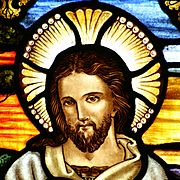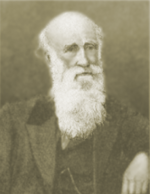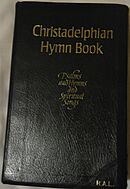Christadelphians facts for kids
The Christadelphians are a group of Christians who believe their faith is a return to the original teachings of the first-century Christians. Their name comes from Greek words and means "brothers and sisters in Christ."
Christadelphians believe the Bible is the inspired word of God. They believe in the virgin birth of Jesus, that he is the son of God, and that he will one day return to Earth. They also practice baptism for adult believers. However, they have some beliefs that are different from many other Christian churches. For example, they do not believe in the Trinity (the idea of God as three persons in one) or that people have an immortal soul.
The movement began in the United Kingdom and North America during the 1800s. It was started by a man named John Thomas. Today, there are about 50,000 Christadelphians in 120 countries. Their local congregations are called "ecclesias."
Contents
History
How the Christadelphians Began
The Christadelphian movement started with John Thomas (1805–1871). He was an English doctor who moved to America. He wanted to find the original truths of the Bible by studying it on his own. He traveled and gave lectures, and many people in the United Kingdom and North America were inspired by his teachings.
In 1848, Thomas wrote a book called Elpis Israel (which means "The Hope of Israel"). In this book, he explained his understanding of the Bible's main teachings. People who agreed with him formed small groups. These groups were known by many names, like "Baptised Believers" or "Believers in the Kingdom of God."
The name "Christadelphian" was chosen during the American Civil War (1861–1865). In the United States, men were being forced to join the army. Those who objected to fighting for religious reasons (called conscientious objectors) had to register with a church. In 1864, John Thomas chose the name Christadelphian for his followers so they could register as objectors.
After John Thomas died in 1871, a man named Robert Roberts helped organize the community. He started a magazine called The Christadelphian, which helped connect believers. The movement grew, especially in the English-speaking world.
Christadelphians in the 20th Century
During World War I and World War II, many Christadelphians continued to be conscientious objectors. Instead of fighting, they often did civilian work to help their countries.
In Germany during World War II, the small Christadelphian community had to meet in secret. One of their leaders, Albert Merz, was put in prison and later executed for refusing to join the army.
After the Second World War, the movement began to grow in developing countries. Today, about 40% of all Christadelphians live in these areas.
What Christadelphians Believe
Christadelphians do not have one single leader or headquarters. Each local group, or ecclesia, is independent. However, most Christadelphians share a set of core beliefs.
The Bible
Christadelphians believe the Bible is their only guide for faith. They see it as being inspired by God. They believe the original text was without error.
God
They believe that God, whose name they often refer to as Jehovah, is the creator of everything. They believe He is a single being and is the Father of all true believers. They do not believe in the Trinity.
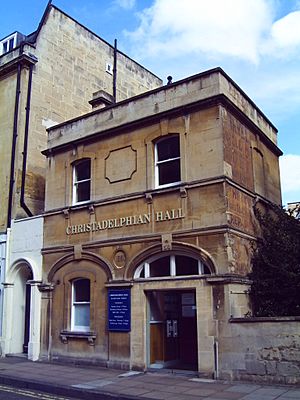
Jesus
Christadelphians believe Jesus is the Son of God and the promised Messiah of the Old Testament. They believe he was a human being who inherited human nature from his mother, Mary. Because he was conceived by God's power, he is also the Son of God.
They teach that Jesus was tempted but never sinned. Because he was perfect, his death was a sacrifice that can bring salvation to people. They believe God raised Jesus from the dead and gave him immortality. He is now in Heaven and will one day return to Earth.
The Holy Spirit
Christadelphians believe the Holy Spirit is the power of God. They do not believe it is a separate person. They believe God uses this power to create things and to save people. They think believers develop a godly character by reading the Bible, which was written through the power of the Holy Spirit.
The Kingdom of God
A central belief for Christadelphians is that Jesus will return to Earth to set up the Kingdom of God. They believe this kingdom will be a real government on Earth, with its center in Israel. Jesus will rule over all nations, and those who are saved will help him.
The Devil and Hell
Christadelphians do not believe in a literal, supernatural being called the devil or satan. Instead, they see the "devil" in the Bible as a symbol for human sin and opposition to God. "Satan" is a word that means "adversary" and can refer to any opponent, including people.
They also do not believe in hell as a place of eternal fire. They believe that those who are not saved will simply cease to exist forever.
Salvation
Christadelphians believe that people are separated from God by sin. To be saved, a person must believe the gospel, repent of their sins, and be baptized by being fully immersed in water. They believe that after death, a person is unconscious until Jesus returns. At that time, the dead will be resurrected and judged. Those who are accepted will receive eternal life and live in God's Kingdom on Earth.
How Christadelphians Are Organized
Christadelphian congregations are called ecclesias, a Greek word for "assembly." Each ecclesia is self-governing.
Most ecclesias have a constitution that includes a "Statement of Faith." This statement lists the main beliefs of the community. To keep their beliefs consistent, members use this statement as a basis for fellowship between different ecclesias.
Christadelphians do not have paid ministers or pastors. Instead, male members of the congregation take turns teaching and leading services. Important decisions are usually made democratically by all the members of the ecclesia.
There are several organizations that help coordinate activities between ecclesias. These include missions for preaching, support networks for counseling, and charities like the Christadelphian Meal-A-Day Fund, which provides humanitarian aid.
Where Christadelphians Live
There are about 50,000 Christadelphians in 120 countries. The largest communities are in:
- Mozambique (17,800)
- Australia (9,734)
- The United Kingdom (8,200)
- Malawi (7,000)
- United States (6,500)
- Canada (3,000)
Worship and Daily Life
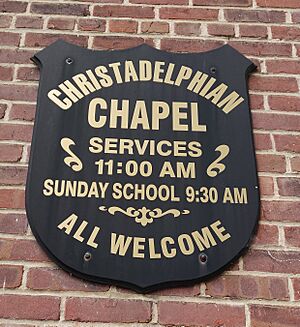
Christadelphians usually meet for worship on Sundays. The main part of the service is the "memorial service," where they share bread and wine to remember the death and resurrection of Jesus. They also have other meetings for prayer, preaching, and Bible study.
Only people who have been baptized are considered members. Before baptism, a person must show they understand and accept the main teachings of the faith.
Christadelphians believe that men and women are equal but have different roles in the church. In formal services, women usually wear a head covering, like a hat or scarf, and do not teach when men are present. However, women participate in many other ways, including teaching children, voting on church business, and serving on committees.
Because they are conscientious objectors, Christadelphians refuse to join the military or police. They place a strong focus on personal Bible study, and many use a plan called the Bible Companion to read the entire Bible each year.
Music and Hymns
Music is an important part of Christadelphian worship. Their hymn books include many traditional hymns from other Protestant churches, but the words are chosen to match their beliefs.
The main hymn book used today was published in 2002. In services, singing is often accompanied by a piano or organ. Some ecclesias also use other instruments like guitars and violins. In different countries, Christadelphians have translated hymns into local languages and created music that reflects their own culture.
Images for kids
-
Gate of the Christadelphian Cemetery near Hye, Texas
See also
 In Spanish: Cristadelfianos para niños
In Spanish: Cristadelfianos para niños
 | Lonnie Johnson |
 | Granville Woods |
 | Lewis Howard Latimer |
 | James West |


